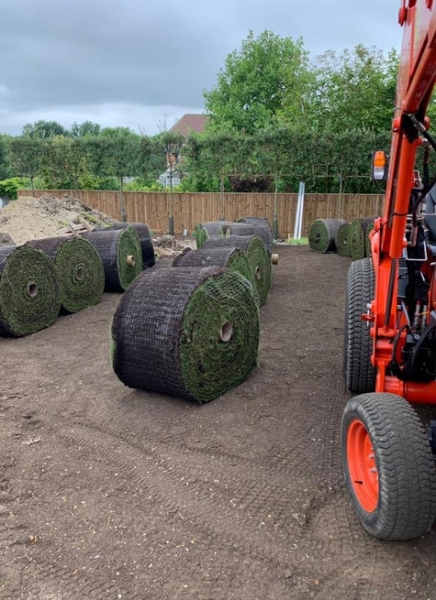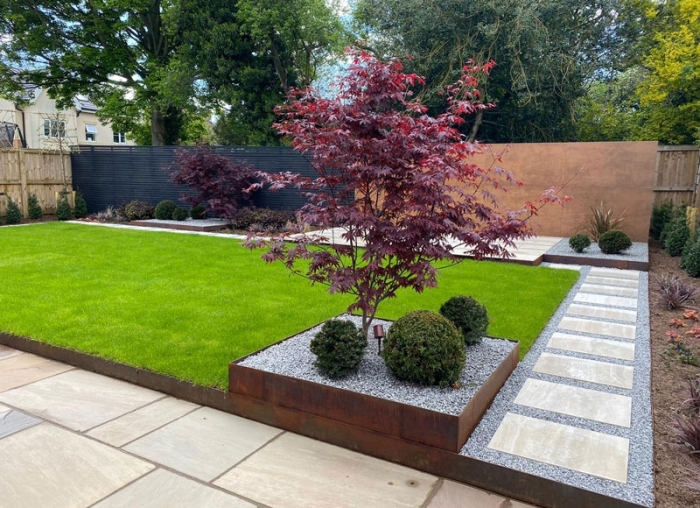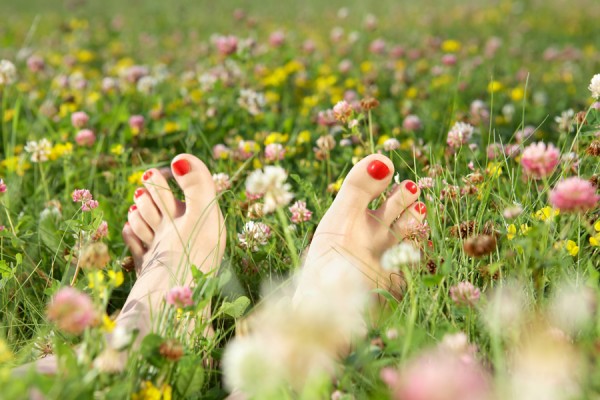Landscaping often involves a mixture of different garden surfaces. Arbour Landscape Solutions Lt...
Filter by:
This is the section of our website where you’ll find everything you need to build beautiful ...
Filter by:
Every outdoor space has three dimensions. Arbour Landscape Solutions offers an extensive range of ...
Filter by:
Introducing our comprehensive range of soft landscaping surfaces for industry professionals. Every...
Filter by:
This is where you’ll find everything you need to build the garden structures specified on yo...
Filter by:
At Arbour Landscape Solutions we know how important drainage is to the success of any landscaping ...
Filter by:
Holding it all together is our range of top quality screws and fixings. Take a good look at the pr...
Filter by:
Lightweight Concrete
Filter by:
We've compiled a comprehensive catalogue of landscaping Tools and Equipment for you to buy or ...
Filter by:
Pots can enhance a garden or commercial landscape hugely, improving a sense of arrival for any sch...
Filter by:
Arbour Landscape Solutions are proud to present this range of stunningly beautiful planters in all...
Filter by:
High-quality light fittings designed and manufactured in the UK. Stylish, durable and with a 10 ye...
Filter by:
Pots can enhance a garden or commercial landscape hugely, improving a sense of arrival for any sch...
Filter by:
Arbour Landscape Solutions are proud to present this range of stunningly beautiful planters in all...
Filter by:
High-quality light fittings designed and manufactured in the UK. Stylish, durable and with a 10 ye...
Filter by:
 TRADE & SELF BUILDERS MULTI-USER ACCOUNTS MULTI USERS
TRADE & SELF BUILDERS MULTI-USER ACCOUNTS MULTI USERS FREE DELIVERY ON ALL YARD STOCK FREE DELIVERY DELIVERIES
FREE DELIVERY ON ALL YARD STOCK FREE DELIVERY DELIVERIES INSTANT ONLINE QUOTES FREE QUOTE BUILDER UPLOAD MY LISTS
INSTANT ONLINE QUOTES FREE QUOTE BUILDER UPLOAD MY LISTSOne of our best selling landscaping materials is natural lawn turf. And for good reason. Laying turf is a fast and efficient way to establish a new lawn. Clients love the instant visual results as within hours it can change the look of a landscaping project from building site to garden. But is turf the best way to create a new lawn? Let’s take a closer look at the turf versus seed debate.
I’m a great fan of Premier Lawns YouTube channel and would recommend it as a tool for any landscaper or garden designer wishing to educate their clients on the subject of lawn care.
Robbie talks in many of his videos (and blogs) about the importance of choosing the best seed mix for the lawn you want to create. Plant breeders have developed a sophisticated palette of lawn grass species and varieties, each one with its own set of advantages. Getting the right seedmix can make the difference between a great lawn and a mediocre patch of grass.
For example, there are grass varieties that thrive in shade, others that tolerate lots of wear and tear, some that will put up with a more relaxed lawn care regime and some that need lots of TLC but produce a really elegant lawn.
Growing a lawn from seed means that you can pick and choose a blend of species and varieties that will suit the clients’ lifestyle AND the conditions on site.
Growing a lawn from turf however, limits your choice of species and varieties. BUT you can be absolutely sure that the turf grower has done their homework very carefully. The seed mixes used on turf farms will have been selected for colour, resilience, speed of establishment, root strength and cost. These guys work on incredibly tight margins and you can be sure that their products are carefully developed so that they are suitable for a really wide range of applications.
In summary, when it comes to turf versus seed, it’s relatively easy to decide which is best for the site. If the client is looking for a specialist lawn such as a bowling green or a shade tolerant lawn, then seed is probably a better choice than turf. If however, the design simply specifies ‘lawn’ then either will be OK. The decision can be made based on cost and your clients expectations of how quickly they can use their new lawn.

For speedier turf installation talk to us about Big Roll Turf - each roll covers 20 m2
I don’t need to teach you how to suck eggs. You know that the soil preparation is going to be the same whether you choose turf or seed to establish your lawn. You also know that laying standard rolls of turf takes more effort than sowing seed. But of course the real issue here is not just how much your back aches at the end of the day - it’s what happens when you leave the site.
Will your clients remember to water their turf religiously every day (or twice a day in hot weather)? What happens if they don’t? Who picks up the bill when it dies?
How about seed? Can you reasonably keep the neighbourhood cats away from that beautiful loose topsoil toilet? Will the seed be lost to flocks of hungry birds?
Then of course there’s the issue of timing. Turf can be laid at any time of year, the only thing that stops the harvesters from rolling is extreme weather. If the ground is frozen or waterlogged it’s almost impossible to harvest turf. Heat on the other hand, won’t stop the harvesters (they work all night when the ground is cooler) BUT in hot weather you need to get that grass unrolled and watered in VERY quickly. Turf in the roll gets so hot that it actually kills and cooks the grass.

Would a garden like this one by Noel Anderton, have such a strong visual impact at the end of the build if the lawn were created from seed?
At the end of the day, designing and building gardens boils down to one thing - customer satisfaction. The turf versus seed debate needs to think about how the client will react to your choice of methodology. Will they be pleased that you have shaved a few pounds off their bill by choosing seed? Or would they prefer a turfed lawn because it’ll look amazing on Instagram when they post their new garden pics?
I’m inclined to lean towards turf on this argument, not least because I’m hoping you’ll have some wonderful images of your work to showcase on our case studies page. Those pictures will also make fabulous marketing material for your business.
Something that is being considered more and more often these days is the sustainability of garden design and landscaping. An established lawn, no matter how it is created, offers a whole host of environmental benefits. Cooling the environment, nurturing soil microbes, soaking up rainwater….the list goes on. Which is why you'll find natural lawn turf amongst the other environmentally friendly landscaping materials in the Arbour Eco Range of products.
Our turf suppliers work hard to ensure that their product is sustainably grown. Whenever possible they use clever mowing techniques rather than herbicides, they avoid pesticides and choose disease resistant grass varieties to minimise the need for fungicides. However, delivering turf is a different matter altogether. A heavy product with a very short shelf life impacts upon the product’s carbon footprint. I'm confident that our suppliers do their very best to minimise carbon footprint and the cost of haulage. They use a pallet network for smaller deliveries and their own, vehicles for larger deliveries. Routes are very carefully planned and their lorries are as fuel efficient as lorries can be....but they're still lorries and by their very nature, they are gas -guzzlers.
Grass seed is lovely and light, it won’t perish in transit and whereas a 1000 square metres of turf would need a whole artic lorry to bring it to you. The seed to cover that same area should weigh less than 40Kg.
I feel I should put a nod to long term lawn care in this section too. Laying sun loving turf in a shaded garden, or using a ‘fine’ seed mix for a football field are not sustainable choices. Ultimately, the plants will fail to thrive and will need intensive care to keep them looking good. Right plant right place applies to lawns too. If you need advice on the best options for your project, our very own Ladylawn is always ready and willing to answer questions.

Does a lawn even need grass? This species rich lawn is attractive, luxurious and pollinator friendly.
Here’s the rub. If it’s been properly laid and kept watered, caring for a turfed lawn in the first 6-8 weeks of it’s life is child’s play. Long term lawn care is a different matter - but that is usually the clients’ responsibility.
Creating a lawn from seed however, can be quite stressful for clients. They’ll have lots of questions for you. “What about these weeds?” “Why does it look patchy?” “When should I feed it?” “How do I know when to start mowing?”. And there’s a higher risk of them making a mistake like scalping the lawn before it’s had time to grow a strong root system.
Your turf versus seed decision needs to consider your client’s lawn care expertise and experience. If in doubt - choose turf.
Nowadays you have a huge choice of landscaping materials to make a lawn from. There’s the classic lawn turf with its velvety sward which is so popular with Arbour Landscape Solutions’ customers. Or, you could choose from a wide range of grass seed mixes to minimise build costs and create the perfect lawn for your project.
Does your lawn need to be 100% grass? For the ultimate in sustainability and biodiversity net gain, why not think about a mix of low growing grasses and flowering plants? It needs less mowing, the bees love it, it tends to be more drought tolerant than close mown grass AND it looks amazing.
Now that I've bamboozled you with the options, I'm here to tell you that the Arbour Landscape Solutions team is always here to help you choose between turf and grass seed. Tell us about your project, about your client's capabilities and how the lawn will be used, and one of us (probably Angela Lambert) will point you towards the best turf or grass seed for the job. If you need bespoke solutions - that's OK too, just click here to get the conversation started.
Would you like to remove the items in your basket and replace them with this order or keep all items in the basket?
